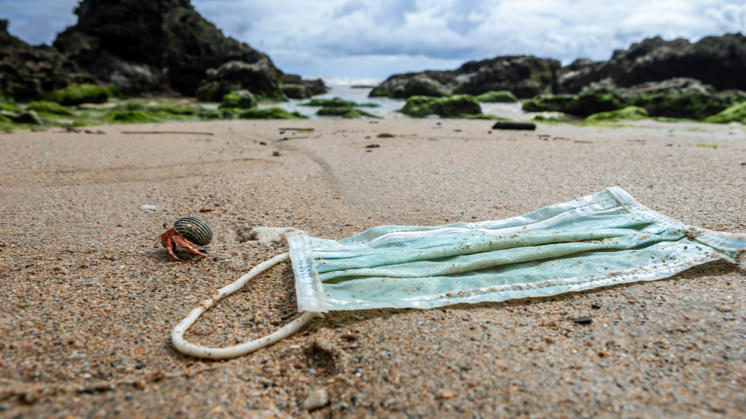How to dispose of the face masks
How to dispose of masks and protect the environment?
Masks are essential for stopping the spread of COVID-19 during the pandemic and they have become an every day accessory. However, what are the effects of huge increase in the use of disposable masks? The environment is in danger of being another victim if masks are not disposed of carefully.

Wearing masks has become a global requirement to stop the spread of COVID-19, although they do have a drawback. Wearing masks is an effective way of preventing the spread of the infection and they have become part of our outfit, but they could be disastrous for the environment, but they could be disastrous for the environment, because the TNT they are made of takes between 400 and 450 years to break down. That's why health authorities the world over are concerned about this new type of environmental pollution.
Masks and their impact on the environment
In recent months, when the pandemic surged, disposable masks that had not been disposed of correctly have been turning up ein cities around the world. In March, groups of environmentalists in Hong Kong raised the alarm when large numbers of used masks started appearing on beaches. Environmentalists have warned that this residue is a threat to human life marine life and wildlife habitats. Even more concerning is that in addition to pollution, this waste may increase the spread of the new coronavirus.
Although alternatives are appearing, most people in the world are using masks made of TNT, which are practical and cheap, but which are not designed to be washed. Production has increased exponentially. For example, in Brazil alone, the Brazilian Textile and Garment Association has manufactured 13.5 million disposable masks after mobilising hundreds of companies. What's more, recycling plants have been forced to adopt strategies to protect workers responsible for collecting and sorting rubbish from becoming infected by masks that have been disposed of carelessly.
How to dispose of masks correctly
The World Health Organisation (WHO) recommends discarding them in the "correct" rubbish bin immediately after use and not reusing them. What is the "correct" bin? Masks and other disposable material that are used to contain the pandemic, such as gloves, must not be disposed of in the recycling bin with packaging, cans, etc. or with organic waste. Do not throw them away with your general household rubbish.
The Brazilian Sanitary and Environmental Engineering Association (ABES) has issued advice on the correct way to dispose of used masks and gloves. The materials should be placed into two small plastic bags - one inside the other. Tie the bags firmly and throw them away with your general domestic waste. If the materials have been in contact with an infected person, take extra care and write "RISK OF CONTAMINATION". on the bag.

SEE INFOGRAPHIC: How to dispose of masks correctly [PDF]
Use of the mask. Keys
Withmore than 30 million confirmed cases and more than a million deathscaused by COVID-19 (as of 30 September 2020),this pandemic is a turning point for the human race.Routines and social interactions have changed around the world and the "new normal" demands social distancing, frequent hand washing - either with hand sanitiser gel or with soap and water - and mask wearing, all for the same purpose - to prevent infection.
Wearing protective masks, which have long been common in the Far East, has become routine. In June,the WHO updated its recommendations to include mask wearing in public spaces.Since then, they have become mandatory in many cities of the world, sometimes withfines imposed for breaching the rules.Today, many people think that their use will continue for health and hygiene reasons, even after COVID-19 is under control.
Experts say that a good mask should cover your nose and mouth and allow the wearer to move naturally without opening the sides.The purpose is to stop saliva droplets from spreading in the air and contaminating other people's faces, lips, noses and eyes.In the throes of this pandemic, masks have becomea sign of protection and solidarity,because sick people avoid infecting others and allow healthy people to protect themselves from infection. This isn't just a case of emergency use for personal protection, but a collective strategy that enables people to protect each other from now on.




